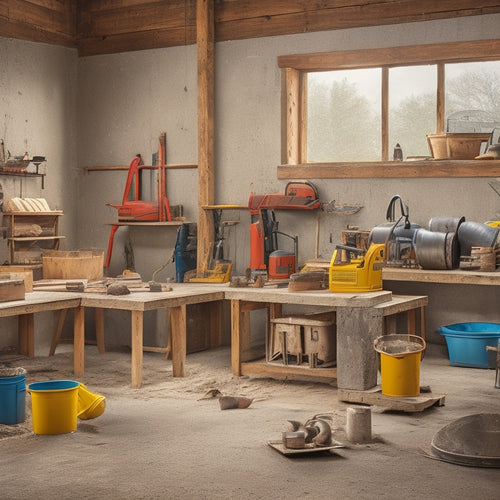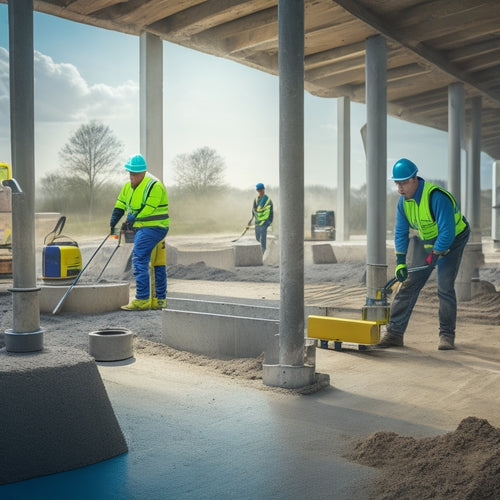
Estimate Concrete Wall Building Costs With These Tools
Share
You can accurately estimate concrete wall building costs by leveraging a set of specialized tools that break down material quantities, labor requirements, and equipment needs into precise calculations. From concrete block cost calculators to wall size and material estimators, these tools help you determine the exact amount of materials needed, including cement, sand, and reinforcement materials. Additionally, you can estimate labor costs, equipment rental fees, and even wall finishing costs with these calculators. By utilizing these tools, you'll be able to create a thorough and accurate cost estimate, ensuring your project stays on budget; now, get ready to dive deeper into the specifics.
Key Takeaways
• Use material estimators to calculate concrete block quantity, wall size, block weight, and cement and sand requirements for accurate budgeting.
• Cost estimation tools help determine mortar and grout costs, labor hours, and material costs to prevent cost overruns.
• Specific material calculators for rebar quantity and weight ensure accurate estimates and prevent over or under-ordering of materials.
• Consider wall finishing costs, which vary based on type and quality of finishes, to get a comprehensive project cost estimate.
• A total project cost estimation tool helps include all costs, including materials, labor, equipment, permits, and inspections, for a complete cost breakdown.
Concrete Block Cost Calculator
Use our concrete block cost calculator to quickly determine the number of blocks you'll need for your project and estimate the total material cost, taking into account factors such as block size, wall thickness, and mortar requirements.
This calculator is essential in ensuring you have an accurate estimate of the materials needed, avoiding costly mistakes and delays.
When selecting concrete block types, consider the project's specific requirements. For instance, solid blocks are ideal for load-bearing walls, while hollow blocks are suitable for non-load bearing partitions.
You'll also need to choose the right block installation techniques, such as the running bond pattern or the stacked bond pattern, depending on the wall's design and structural needs.
Wall Size and Material Estimator
Determine the total square footage of your wall by calculating its length, width, and height to accurately estimate the materials needed for your concrete wall building project. This calculation will give you the total area that needs to be covered with concrete blocks, which is essential for budgeting and planning.
Next, consider wall thickness considerations, as this will impact the amount of materials you'll need. A thicker wall will require more concrete blocks, mortar, and other materials, increasing your overall cost. You'll also need to factor in insulation materials, such as foam board or fiberglass batts, which will add to your material costs.
Using a wall size and material estimator tool, you can input your wall's dimensions and thickness to get an accurate estimate of the materials needed. This tool will calculate the number of concrete blocks, bags of mortar, and other materials required to complete your project.
Block Weight and Quantity Tool
Block Weight and Quantity Tool
Your block weight and quantity calculations are essential in estimating concrete wall building costs, as they directly impact the overall material expenses and logistics of your project. To accurately calculate these values, you'll need to conduct a block density analysis. This involves determining the weight of a single block, which varies depending on the type and brand used.
| Block Type | Weight (lbs) | Quantity per Pallet |
|---|---|---|
| Standard Concrete Block | 35-40 | 80-100 |
| Lightweight Concrete Block | 20-25 | 120-140 |
| Insulating Concrete Block | 30-35 | 90-110 |
| Solid Concrete Block | 40-45 | 60-80 |
| Hollow Concrete Block | 25-30 | 100-120 |
Mortar and Grout Cost Estimator
You'll need to calculate the mortar and grout requirements for your concrete wall project, as these materials account for a significant portion of the overall construction cost. To do this, you'll need to determine the type of mortar required, as different mortar types have varying costs. For instance, you may need to use a specific type of mortar for areas exposed to high temperatures or heavy loads.
Next, you'll need to calculate the quantity of grout required for your project. Grout applications can vary, from filling gaps between blocks to creating decorative joints. You'll need to take into account the surface area of the blocks, the width of the joints, and the depth of the grout application to accurately estimate the amount of grout needed.
Using a mortar and grout cost estimator, you can input these variables to get an accurate estimate of the costs involved. Be sure to include any additional materials, such as sand or admixtures, that may be required for the mortar or grout.
Labor Cost Calculation Guide
Calculating labor costs for your concrete wall project involves breaking down the construction process into tasks and estimating the time required to complete each one. This helps you determine the total labor hours needed, which you can then multiply by the labor rate to get the total labor cost.
You'll need to take into account the labor market, cost trends, and regional differences that may impact your project budgeting. Effective workforce management is essential, as it guarantees you have the right people with the right skill requirements for each task.
When selecting a contractor, reflect on their experience, reputation, and labor rates. Be sure to factor in overtime rates, as they can greatly influence your project costs.
A thorough labor cost calculation will help you create a realistic project budget and avoid cost overruns. By understanding the labor cost components, you can make informed decisions about contractor selection, workforce management, and resource allocation.
With a solid labor cost calculation guide, you'll be better equipped to manage your project's financials and guarantee a successful concrete wall construction project.
Cement and Sand Quantity Calculator
When building a concrete wall, you'll need to calculate the exact amount of cement and sand required to avoid wastage and guarantee structural integrity.
To do this, you'll need to determine the cement volume needed, considering factors like wall dimensions and concrete mix proportions.
Next, you'll use a sand requirement estimator to calculate the precise amount of sand required, taking into account the cement volume and other variables.
Cement Volume Needed
To determine the cement volume needed for your concrete wall, it's essential to accurately calculate the total volume of concrete required, which depends on the wall's dimensions and thickness.
You'll need to take into account the length, width, and height of your wall, as well as its intended thickness. Once you have these measurements, you can use a cement volume calculator or a concrete volume calculator to determine the total volume of concrete required.
When selecting a cement type, you'll need to take into account the mixing ratio, which varies depending on the type of cement you're using.
For example, a general-purpose cement might have a mixing ratio of 1:2:4 (cement:sand:aggregate), while a high-strength cement might have a ratio of 1:1.5:3.
Be sure to consult the manufacturer's instructions for the specific mixing ratio recommended for your chosen cement type.
Sand Requirement Estimator
You'll need a reliable sand requirement estimator to determine the precise amount of sand required for your concrete wall, taking into account the cement volume and mixing ratio. This calculator helps you avoid under or overestimating sand quantities, which can greatly impact your project's budget and structural integrity.
With a sand requirement estimator, you can input the cement volume, mixing ratio, and desired concrete strength to get an accurate calculation of the required sand quantity.
When selecting a sand requirement estimator, consider one that also takes into account sand quality assessment. This feature helps you evaluate the quality of your sand sourcing options, ensuring you're using suitable material for your concrete wall.
Look for an estimator that allows you to input sand properties, such as fineness modulus and moisture content, to get a more accurate calculation.
Reinforcement Material Estimator
When estimating concrete wall building costs, you'll need to calculate the reinforcement materials required.
To do this, you'll want to determine the steel quantity, rebar weight, and material cost.
Steel Quantity Calculator
Your concrete wall project requires accurate estimation of steel reinforcement material, and a steel quantity calculator helps you determine the exact amount of rebar needed for your structure. This tool takes into account factors such as steel strength, wall thickness, and spacing to provide an exact calculation.
By inputting the required data, you'll get an accurate estimate of the rebar quantity, guaranteeing you don't over or under-order materials.
When using a steel quantity calculator, consider the type of rebar you're working with, as different types have varying strengths and requirements. For instance, high-strength rebar may require specialized welding techniques to guarantee proper bonding with the concrete.
Additionally, the calculator will account for the wall's dimensions, including length, width, and height, to provide a thorough estimate.
Rebar Weight Estimator
Having determined the quantity of rebar required, you can now use a rebar weight estimator to calculate the total weight of reinforcement material needed for your concrete wall project. This is essential because the weight of rebar affects the overall cost and logistics of your project.
A rebar weight estimator takes into account the type of rebar you're using, its diameter, and the total length required. Different rebar types, such as epoxy-coated or galvanized rebar, have varying densities, which impact the total weight. For instance, epoxy-coated rebar is heavier than black rebar due to the added coating.
The estimator also considers the rebar installation method, as this can influence the amount of rebar needed. By accurately calculating the weight of rebar, you can guarantee you have enough material on site, reducing the risk of delays and cost overruns.
With a rebar weight estimator, you'll have a precise calculation of the reinforcement material needed, giving you a better understanding of your project's scope and budget.
Material Cost Calculator
With the rebar weight calculated, you can now input the result into a material cost calculator, also known as a reinforcement material estimator, to determine the total cost of the rebar required for your concrete wall project.
This tool allows you to specify the material type, such as epoxy-coated or galvanized rebar, and the unit price per pound or ton. You can also input the labor rates for cutting, bending, and placing the rebar to get a thorough estimate of the total material cost.
The material cost calculator takes into account the weight of the rebar, the material type, and the labor rates to provide an accurate estimate of the total cost.
You can adjust the input parameters to explore different scenarios, such as using different material types or labor rates, to get a better understanding of the cost implications.
Wall Finishing Cost Calculator
To accurately estimate the total cost of your concrete wall building project, you'll need to factor in the finishing costs, which can vary widely depending on the type and quality of finishes you choose. Finishing techniques can greatly impact the final look and feel of your walls, and the costs associated with them can add up quickly.
To help you estimate these costs, consider the following wall finishing cost breakdown:
| Wall Texture Options | Cost per Square Foot | Description |
|---|---|---|
| Smooth Finish | $1.50 - $3.00 | A basic, smooth finish with minimal texture |
| Stamped Finish | $2.50 - $5.00 | A decorative finish with a pattern or design |
| Exposed Aggregate | $3.00 - $6.00 | A textured finish that reveals the aggregate material |
| Specialty Finishes | $5.00 - $10.00 | Custom finishes with unique textures or designs |
Keep in mind that these costs are just estimates, and the final cost will depend on factors like the size of your walls, the complexity of the finish, and the location where you're building. By considering these costs upfront, you'll be better equipped to plan and budget for your concrete wall building project.
Total Project Cost Estimator
You've accounted for the finishing costs; now it's time to estimate the total project cost by factoring in additional expenses such as materials, labor, and equipment.
This is where the Total Project Cost Estimator comes in – a thorough tool that helps you calculate the overall cost of your concrete wall building project.
To use this estimator, you'll need to input the total material cost, labor cost, and equipment rental cost. Be sure to include all the necessary materials, including concrete, rebar, and formwork, as well as the cost of any necessary permits and inspections.
The Total Project Cost Estimator will then provide you with a detailed cost breakdown, allowing you to identify areas where you can optimize your project budget.
By having a clear understanding of your total project cost, you can make informed decisions about where to allocate your resources and guarantee that your project stays within budget.
With this tool, you'll be able to create a realistic project budget and avoid costly surprises down the line.
Frequently Asked Questions
Can I Use These Tools for Estimating Retaining Wall Costs?
You're wondering if you can use these tools to estimate retaining wall costs. The answer is yes, but you'll need to adjust the calculations to account for specific retaining wall materials and construction labor requirements.
Consider the type of wall, soil conditions, and drainage needs to accurately estimate material quantities and labor hours.
Are These Tools Suitable for DIY Concrete Wall Projects?
As you envision your DIY concrete wall project taking shape, you're probably wondering if these tools are suitable for your venture.
The answer is yes! These tools are designed to help you accurately estimate costs, ensuring your project budgeting stays on track.
With precision, you'll be able to calculate materials, labor, and equipment costs, giving you a clear picture of your expenses.
This will help you make informed decisions, avoiding costly surprises and ensuring your DIY concrete wall project is completed within budget.
How Do I Account for Wall Corners and Curves in Estimates?
When calculating concrete wall costs, you'll need to account for wall corners and curves.
For corners, you'll make corner calculations by adding the cost of additional materials and labor required for the angular joints.
For curves, you'll need to make curve adjustments, factoring in the increased complexity and material usage.
Do These Tools Provide Estimates for Concrete Wall Insulation?
Can you really afford to overlook the thermal performance of your concrete walls?
When it comes to concrete wall insulation, you're probably wondering if these tools provide accurate estimates. The answer is yes.
They factor in various insulation materials and their corresponding R-values to guarantee your walls meet energy efficiency standards.
Can I Use These Tools for Estimating Concrete Fence Costs?
You're wondering if these tools can help you estimate concrete fence costs. The answer is yes, but you'll need to take into account specific factors.
Fence height, for instance, drastically impacts costs, as taller fences require more materials and labor.
Additionally, material choices, such as decorative toppings or specialized concrete mixes, will also influence your estimate.
Conclusion
You've got all the tools you need to estimate concrete wall building costs.
Now it's time to crunch the numbers and get a clear picture of your project's expenses.
Don't let costs slip through the cracks - use these calculators to build a solid budget from the ground up.
With a solid plan in place, you'll be breaking ground in no time, and your project will be off and running like a well-oiled machine.
Related Posts
-

What Tools to Rent for a Concrete Home Reno
When tackling a concrete home renovation, you'll need to rent a variety of specialized tools to get the job done. For...
-

Must-Have Handheld Tools for Concrete Repair
When tackling a concrete repair project, it is crucial to have the right handheld tools to achieve a professional fin...
-

What Tools Ensure Precise Concrete Leveling Results
You need a range of specialized tools to achieve precise concrete leveling results. Laser leveling instruments provid...


